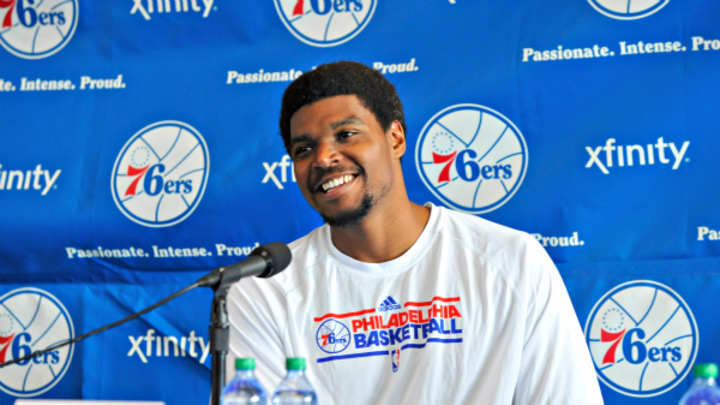Sixers CEO apologizes to fans for Andrew Bynum's lost season

Andrew Bynum did not play a single game for the 76ers. (David Dow/NBAE via Getty Images)
The blockbuster trade that sent Dwight Howard to the Lakers didn't exactly pan out all that well for three of the four teams involved. That was especially the case for Philadelphia, which gambled and lost on Andrew Bynum.
The Sixers dealt Andre Iguodala, Nikola Vucevic, Moe Harkless and a future first-round pick for the All-Star center. But Bynum went on to miss the entire season while making bizarre, unapologetic decisions that complicated his rehabilitation from injury. The ambiguous, always-distant return dates created an extended waiting game for Sixers fans who held out hope, up until two knee surgeries formally ended Bynum's comeback in mid-March. Philadelphia got the full Bynum experience -- filled with promise and frustration -- without ever seeing him take the court.
Scott O'Neill, the Sixers' new CEO, empathizes with frustrated fans. In an interview with a Philadelphia radio station, O'Neill -- after some prompting from host Angelo Cataldi -- apologized to those fans disappointed by Bynum's time with the team and rankled by the move to acquire him. Via Keith Pompey of The Philadelphia Inquirer:
“I apologize on behalf of the Sixers to any fan who invested and thought Bynum was going to be their guy and be the savior,” said O’Neil, while being a guest on Cataldi's radio show. “At the end of the day that’s our apology to every fan – not just to you [he told Cataldi].
“However, we are going to take some chances when we can take some chances. And sometimes, they're not going to work. And sometimes, they are. When they don’t work, we are not going to ever talk about a player negatively. That’s not going to help us or the franchise or the fans. That’s not going to help us recruit. It doesn't help us go out and grab free agents. It doesn’t help us when we are evaluating talent. It doesn’t help us when we are talking to coaches. It just doesn't help.”
O'Neill touches on two very important points:
1. It can be tempting to evaluate NBA team's moves by that which follows; a major addition followed by a championship would seem to be a smart move, while a risky transaction followed by a lottery year might at first seem foolish. But decisions ought to be evaluated by the factors and calculus that went into making them in the first place, and through that framework the gamble to acquire Bynum still makes a great deal of sense.
The Sixers weren't in position to make a big addition last year as long as Iguodala's $15 million salary was clogging up their cap sheet, so they opted to punt on what were viewed at the time as a few decent prospects in Vucevic and Moe Harkless for a low-post big man coming off a season in which he averaged 18.7 points and 11.8 rebounds. He had his injuries and his quirks, but Philadelphia was willing to wait out a season if it meant Bynum's inching toward better health and a long-term stay. Nothing worked out as planned (he signed with the Cavaliers earlier this month), but Bynum was still a talent worth taking a chance on.
2. Franchises hold opinions about lots of players, but have almost no incentive to share them. If a team likes a certain potential target, it makes more sense to convey that information privately. If it thinks little of, say, an unmotivated center who has since moved on, then there's really nothing to gain by badmouthing him through public channels. Even if Bynum is now a sore spot or punchline around the Sixers' office, his time with the team is done, as is the franchise's general concern with him.

Rob Mahoney is an NBA writer dedicated to the minutiae of the game of basketball, its overarching themes and everything in between. He joined the Sports Illustrated staff in 2012.